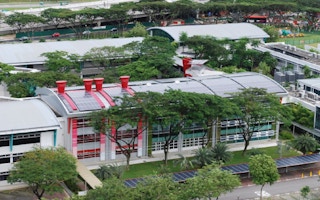Singapore’s Building and Construction Authority (BCA) on Wednesday launched a one-stop shop that will showcase existing and upcoming research and development initiatives focused on energy efficient building solutions.
The Green Buildings Innovation Cluster (GBIC), an integrated research, development and demonstration (RD&D) hub, will bring together best practices and current RD&D efforts in the country, including the agency’s zero-energy building flagship project.
The government, through the National Research Foundation, will dedicate S$52 million over five years to support GBIC, which was announced by Senior Minister of State for National Development Lee Yi Shyan at the BCA Breakfast Talk for CEOs, held in conjunction with the International Green Building Conference 2014.
“GBIC will help build up R&D capability, conduct demonstration projects, and ‘match make’ academia and industry to accelerate the adoption of novel technologies,” he told 200 industry leaders.
GBIC was developed as part of the government-wide initiative called the Energy National Innovation Challenge, which seeks to develop solutions in the areas of energy resilience, environmental sustainability and urban systems. BCA said GBIC will provide platforms for new technologies and bring them closer to industry adoption.
“
We need to be relentless in our research for more effective green building solutions and combine our efforts in developing large scale and high impact demonstration projects to educate both the industry and public
Dr John Keung, BCA’s chief executive officer
The new cluster is another testament to Singapore’s commitment to lead the green building movement in the region to hasten the wider acceptance of green building practices locally and regionally, said Dr John Keung, BCA’s chief executive officer.
“We need to be relentless in our research for more effective green building solutions and combine our efforts in developing large scale and high impact demonstration projects to educate both the industry and public,” he stressed.
The GBIC will feature key activities that are focused on energy efficiency and will be administered by BCA’s Centre for Sustainable Buildings and Construction at the BCA Academy. These include:
- Energy Efficient Demonstrations - a showcase of promising innovations in large-scale buildings, with the end goal of making these technologies more cost competitive, as well as verify its replicability.
- National Building Energy Efficiency Repository - a new databank that will collect and analyse essential building systems data, operation, and occupant-related metrics of the demonstration projects, which could be useful in the setting of benchmarks for various building types as well as in developing best practices and standards.
- Capability Building - tapping experts to drive key research areas and to fill in the gaps in the areas of integrated design, building envelope and façade system, building management and information system, air-conditioning and mechanical ventilation, as well as on policy and behavioural studies.
Eight industry players, which already have a number of green building portfolios under the BCA Green Mark certification scheme, will participate in the initial phase, noted the agency.
These partners include the Ascendas Land Singapore, CapitaLand, City Developments, the Housing and Development Board, JTC Corporation, Keppel Land International, National University of Singapore and the Nanyang Technological University.
“Some of the world’s fastest growing cities are in Asia and they require tangible green building solutions…We are glad to have our partners on board to support us in moving a step closer to translating the results of our RD&D efforts into actual realisation,” said Keung.
Speaking at the event, Dr Susan Mazur-Stommen, director at the American Council for an Energy Efficient Economy, highlighted the need for engagement programmes to influence users in commercial buildings to reduce energy use. These initiatives - involving direct communications and social ‘nudges’ to influence behaviour - helped to save at least 4 per cent in energy costs in case studies that the council had carried out, she said.
Seah Kian Peng, chief executive of local supermarket chain NTUC Fairprice, also shared with the audience how the co-operative experienced a “steep learning curve” in their efforts to reduce their carbon footprint. He noted that while bigger companies may have the resources to implement sustainable practices, smaller firms often do not know how to begin.
He urged property developers to provide guidelines, and consider incentives such as lower rent for tenants that help to reduce energy use by implementing green practices.
“We need some help from the government, but also peer pressure and building up social awareness. Tenants need to do their part and consumers also need to understand and accept why we’re moving in this direction,” he said.
Our special event coverage of the International Green Building Conference 2014 is brought to you by City Developments Limited (CDL).













